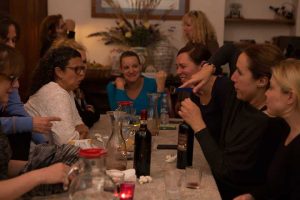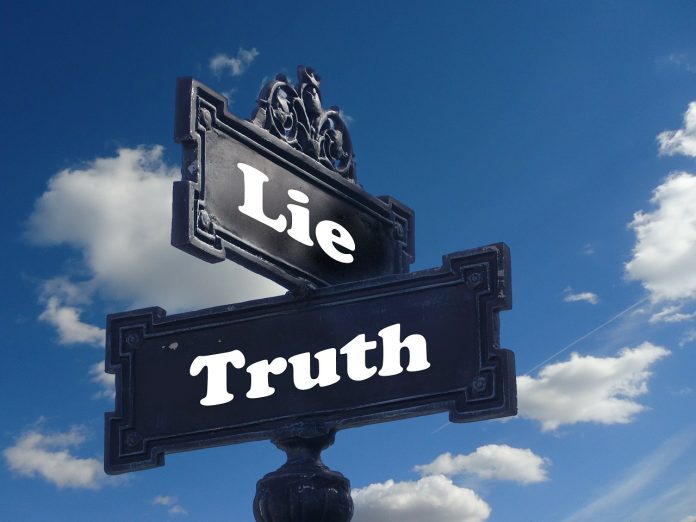By Amelia Zahm
“Lying is done with words, and also with silence.”
“The liar lives in fear of losing control. She cannot even desire a relationship without manipulation, since to be vulnerable to another person means for her the loss of control.”
–Adrienne Rich
I sat down to write about lies. More specifically, I intended to write about your lies, all the millions of tiny and gigantic untruths you spun into a glistening web around you and me. I set out to tug on those fibers, to peel back the sticky net and expose the raw, pink flesh of truth hiding underneath, to reveal you. I want to bring your greatest fear to life. I want the world to see behind your mask, and I want to be the one who pulls it off. That’s the meanness in me.
But I can’t hold onto meanness the way you do. I don’t have the stomach for it. Anger and jealousy flash through me, blazing then burning out. I’ve learned to clean up the debris, compost it, and move on. I’ve seen what holding a grudge can do. During the twenty years of our friendship, I watched you smolder with resentment and envy when you felt slighted, upstaged, or challenged. I just never believed you’d turn that on me.
But then the lie, that last lie, rose to the surface, and although I’d watched fibs and half-truths float by for years, this one felt too big to ignore. So I asked the question. “Why? Why didn’t you tell me? Why is this more important than friendship, loyalty, trust?” I’ll never know, because you never spoke to me again. I committed the cardinal sin. I brought the lie into the light. I called you out.
In your defense, it was a lie of omission. An avoidance. A secret. That doesn’t count, right? And even if it does, why does it matter? You were taking care of yourself, going after what you wanted, making sure nothing and no one got in your way. It’s the American way.
The thing about a lie is, there’s never just one. They stick together, holding each other up. One requires another and another and another, as the weaver strives to create a solid structure, a net, a cover, a trap. As I step back and look with fresh eyes, sunlight glints on the silky fibers of your web, and twenty years of shared conversations and secrets drop, like beads of dew, bursting. I’ve broken free, but what have I left behind? What was real? What was true?
***
I’ve never been particularly skilled in the art of lying. I stutter and stumble when I try, filling my story with numerous ums, and uhs. My high school English teacher once asked me, “Has anyone ever told you that when you start to lie, your eyes cross?” No wonder my parents could always see through my attempts at deception. When I set out to study truth, I thought it would be natural.
As part of my training to become a yoga teacher I read the Yoga Sutras of Patanjali. In Sanskrit, the classical language of India, sutra means thread. The sage Pantanjali weaved together 196 aphorisms in his ancient work that would become the foundational text for the practice of yoga – not just the poses, but the ethical practices and principles that guide each serious practitioner toward an enlightened life.
The yamas and niyamas, or restraints and observances, form the core of an evolved consciousness. In section 2.30, Patanjali says, “Non-violence, truth, abstention from stealing, continence, and absence of greed for possessions beyond one’s need are the five pillars of yama.” [1] In his translation, yoga master B.K.S Iyengar interprets this sutra: “The principle of yama involves wishing no harm in word, thought or deed; being sincere, truthful and honest; not stealing or misappropriating another’s wealth or possessions; chastity; and not accepting gifts or possessing only what one needs, without being greedy.” These are tall orders.
Studying and reflecting helped me understand the philosophy, but yoga happens through practice, so I set out to embrace the yamas by devoting a focused week to each. I thought truthfulness would be the easy one. I am an honest person, after all. Imagine my surprise when I realized the myriad of un-truths that slipped through my lips every day.
Lie: “I’m sorry I’m late. I got stuck behind a herd of cattle on the highway, got an important phone call, ran out of gas”
Truth: “I am so unorganized that I wasn’t paying attention to the time. My own bullshit is more important to me than my obligation to you.”
Lie: “I put the check in the mail two days ago.”
Truth: “I’m writing the check now and will put it in the mail tomorrow. I procrastinate because I don’t want to face my financial difficulties.”
Lie: “I’m great! Thanks for asking.”
Truth: “I’m stressed, unhappy, and I’m just being polite. I wish you hadn’t asked.”
In every case, my little lies were designed to maintain my self-created image, hide an embarrassing truth about myself, or avoid a genuine interaction with another person. I wondered how I could speak and act more truthfully without resorting to blunt, aggressive speech. After all, wishing no harm in word, thought, or deed was also on my list. But what would the truth sound like? And what would happen if I told it?
Truth: “I’m sorry I’m late. I really am. I overslept.”
Response: “I understand. I’ve been having trouble sleeping lately, and find it really hard to get up in the morning.”
Result: I gathered valuable information from one of my acupuncture patients that helped me form an accurate diagnosis and provide better treatment.
Truth: “I will mail that payment tomorrow. I apologize. I’ve been having some financial difficulties, but am working hard to get caught up.”
Response: “Ok. A lot of people are struggling right now. Thanks for your honesty. I’ll make a note in your file so that your late payment doesn’t affect your credit.”
Result: I felt an immediate sense of relief and was able to let go of a mountain of worry.
Truth: “Honestly, I’m having a tough day. I’ve just been out of sorts lately.”
Response: “Really? Me too! I just got some troubling results after my annual physical…..”
Result: I shared an open, heartfelt conversation with the woman who runs the local coffee shop about our diets, our lifestyles, and the ways we both succumb to stress. Our conversation ended with laughter, a hug, and a sense of connection.
My week with truthfulness turned out to be the most difficult of my yama practice, but I carry the lessons I learned close to my heart. I still make excuses and hide behind smiles I don’t feel, but I’m more aware of the reasons I make these choices. I recognize my need to withdraw into myself or create a barrier between me and other people. In the spirit of non-violence, I strive to be patient and gentle with myself, believing that I can do better next time.
***
The truth hurts. In the Bible, John 8:32, to be exact, Jesus says to a group of Jewish followers, “And then you will know the truth, and the truth will make you free.” Gloria Steinem added, “The truth will set you free, but first it will piss you off.”
When I realized a friend I’d trusted for twenty years lied to me it hurt, like a knife slipped silently between my ribs. And as I stepped back and watched the Gordian knot of lies she’d tied around us unravel, that knife twisted, tugging on my intestines and pulling me into myself. I could feel the blade, but when I looked down at the handle, I saw two hands: hers and mine. It takes only one person to tell a lie, but in order for it to live, someone must believe. I believed not one lie, but hundreds.
I could write the whole story, all the fibs, the deceptions, the manipulations, but it would read like melodrama, and the truth is, I don’t want anyone to see my gullibility, my vulnerability, my foolishness, my complicity. I uncovered a lie. Then another and another. Through the pain of these revelations, I found freedom, not just from a relationship built on lies, but from my own self-deceptions. The truth became a mirror, and I forced myself to look, even if I didn’t like what I saw.
Last year I found myself drowning in a sea of financial chaos. In my monthly meeting with my meditation instructor I unfurled the details of my situation. “I’m right on the delicate edge,” I told him. “If one more thing goes wrong, I could lose everything – my house, my business, everything.” I wanted comfort. I wanted reassurance. I wanted him to lie, and tell me everything would be ok.
Instead he said, “You’re right. That could happen.” Stunned, I didn’t speak. That could happen. It could happen. The worst outcome I could imagine was not just possible, but likely. I inhaled. And exhaled. And as I inhaled again, I realized the pressure that had been constricting my chest for weeks had dissipated. I exhaled and felt a rush of stress and worry leave my body. The truth was that it could happen. If I things didn’t change, if I didn’t make some important decisions, if karma wasn’t on my side, that could happen. And I would still be alive and breathing and healthy. And then the next thing would happen. And the next thing and the next thing. And with that realization, that truth, I felt an internal freedom that had been eluding me for months.
People lie for a variety of reasons: the desire to preserve a reputation, avoid a painful admission, keep a friend or lover close, protect one’s self from embarrassment. We look for ways to save face, control our relationships, manipulate our circumstances. I hide behind lies just like everyone else. But I wonder, what if I could live my life with the clarity and precision of truth? How would my life and my relationships change?
What if I hadn’t told my Aunt that I loved her mutton stew, when it actually made me gag? What if I told my Mom that I didn’t want her to make me special dresses for Easter and Christmas, that they made me feel conspicuous and self-conscious? What if I told my parents that I didn’t fall asleep when I wrecked the pickup, that when I drove into the gravel, down the bar ditch and into the pond, I was actually kissing the boy in the passenger seat? What if I told my friend that I avoid being around her husband because he made sexually suggestive comments to me two months before he started an affair with someone else?
I’ve held these secrets close, some of them for years, and for all but one, revealing them means little. My parents are gone. My aunt died last summer. But I still see my friend, and my secret separates us like a gorge. I feel the wind of it billowing up from the bottom, but I hold my tongue. She forgave her husband for cheating, but would she forgive me? Is my silent lie any less of a betrayal? After all my study and self-exploration, I wonder, what kind of liar am I?
***
Mark Twain said, “Truth is stranger than fiction, but it is because Fiction is obliged to stick to possibilities; Truth isn’t.” Where would we get our greatest stories if everyone told the truth?
What if two crazy, love-struck teenagers confronted their parents and said, “To hell with your stupid family rivalry. We love each other, and we’re going to be together.” No Romeo and Juliet. What if Mr. Darcy told the truth about George Wickham from the start? No Pride and Prejudice. What if Walter told Skyler he was cooking meth to set her and the kids up financially? No Breaking Bad. And what if Olivia told Fitz the election was rigged from the beginning? No Scandal.
No classic exists in my tale. It’s the simple story of one friend betraying the trust of another, suitable for nothing more than a short essay or a Lifetime movie. But this truth hurt. And it set me free. But first, it pissed me off.
***
I always knew she told lies, sometimes big lies, sometimes small lies, sometimes lies that had no apparent purpose. I sat in her office and listened as she told her boyfriend she was on the freeway, already on her way home. I left her voice on the answering machine at my house so that when her mother called, she’d believe Jeanne still lived with me instead of with her boyfriend. We were in our forties when she got pregnant during a summer fling. She didn’t tell her family—three sisters, three brothers, her mother—until she was eight months along. It was easy. They were all in Illinois.
In spite of all I witnessed, I was shocked when I realized she lied to me. In hindsight, I laugh at myself. What did I expect? I’d been watching her for the twenty years we’d been friends, many of those years spent living under the same roof. But her deceit stunned me, left me reeling and confused. And her reaction when I confronted her ended our relationship. One email, and she never spoke to me again. It’s been five years.
I noticed small half-truths, wondered about stories she told me, negative comments she made about other friends, situations she described to build walls between me and other people, but this lie dared me to speak up. I felt nauseous and anxious. At night I tossed and turned, questions bouncing off my skull as I dug for the source of my distress. Not hot, like anger. Not seething and squirming, like jealousy. But hollow and cavernous, something akin to loss or grief. Something born of silence.
I realized that it wasn’t the subject of the lie that mattered. The lie, no matter what the content, lived. It thrived. It metastasized, its root the betrayal of trust. I understood, finally, that truth had no priority in our relationship, that she believed hiding her actions in order to get what she wanted seemed a better course than talking to me, the friend she told others was ‘like a sister.’
And what do I feel now that she’s gone? The stab of disappointment in myself, disappointment at my own gullibility, my complicity in her deception. The heaviness of grief over a friendship lost. But mostly, the weightlessness of profound relief that emerged over time, once the truth came to light.
[1] Iyengar, B.K.s., Light on the Yoag Sutras of Patanjali, Thorsons, 1996


Get ready to connect to your joy, manifest the life of your dreams, and tell the truth about who you are. This program is an excavation of the self, a deep and fun journey into questions such as: If I wasn’t afraid, what would I do? Who would I be if no one told me who I was?
Jennifer Pastiloff, creator of Manifestation Yoga and author of the forthcoming Girl Power: You Are Enough, invites you beyond your comfort zone to explore what it means to be creative, human, and free—through writing, asana, and maybe a dance party or two! Jennifer’s focus is less on yoga postures and more on diving into life in all its unpredictable, messy beauty.
Note Bring a journal, an open heart, and a sense of humor. Click the photo to sign up.
